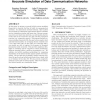Free Online Productivity Tools
i2Speak
i2Symbol
i2OCR
iTex2Img
iWeb2Print
iWeb2Shot
i2Type
iPdf2Split
iPdf2Merge
i2Bopomofo
i2Arabic
i2Style
i2Image
i2PDF
iLatex2Rtf
Sci2ools
SIGMETRICS
2003
ACM
2003
ACM
A hybrid systems modeling framework for fast and accurate simulation of data communication networks
In this paper we present a general hybrid systems modeling framework to describe the flow of traffic in communication networks. To characterize network behavior, these models use averaging to continuously approximate discrete variables such as congestion window and queue size. Because averaging occurs over short time intervals, one still models discrete events such as the occurrence of a drop and the consequent reaction (e.g., congestion control). The proposed hybrid systems modeling framework fills the gap between packet-level and fluid-based models: by averaging discrete variables over a very short time scale (on the order of a round-trip time), our models are able to capture the dynamics of transient phenomena fairly accurately. This provides significant flexibility in modeling various congestion control mechanisms, different queuing policies, multicast transmission, etc. We validate our hybrid modeling methodology by comparing simulations of the hybrid models against packet-...
| Added | 05 Jul 2010 |
| Updated | 05 Jul 2010 |
| Type | Conference |
| Year | 2003 |
| Where | SIGMETRICS |
| Authors | Stephan Bohacek, João P. Hespanha, Junsoo Lee, Katia Obraczka |
Comments (0)

